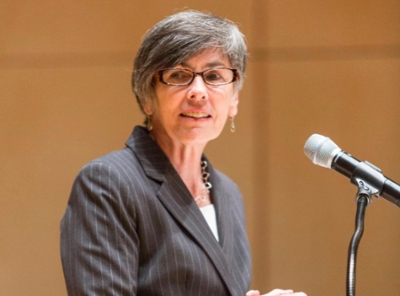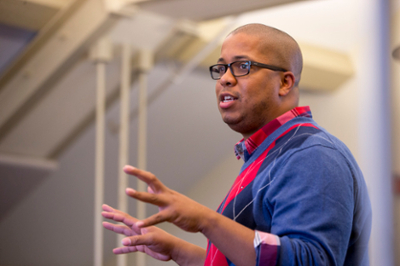Distribution Requirement Being Updated to Move from Awareness to Engagement
By Tom PorterBowdoin has introduced plans to update one of its distribution requirements to better help students understand and analyze structures of privilege and inequality.

Faculty members meeting in September approved an updated motion to revise the current Exploring Social Differences (ESD) distribution requirement and rename it Difference, Power, and Inequity (DPI). DPI courses will be phased in over the next two years and are designed to help students examine structures of privilege and inequality and how these structures affect their own experiences.
Senior Vice President and Dean for Academic Affairs Jennifer Scanlon said: “The faculty decision to transition the ESD requirement to one focused on difference, power, and inequity is part of our ongoing and necessary work on race and racism and signals our collective responsibility to shift from awareness to active antiracist practices. It also shifts the College in a significant way from merely exposing students to differences to enabling them to engage their worlds and each other with greater respect, skill, and understanding.”
“From its inception, Bowdoin has understood the value of preparing students to be engaged citizens and responsible agents of change,” said the Curriculum and Educational Policy Committee (CEP) in its proposal to faculty, citing the inaugural address of President Joseph McKeen in 1802. McKeen described how the hallmark of a liberal arts education is “founded and endowed for the common good, and not for the private advantage,” so that its students are not “enabled to pass through life in an easy or reputable manner, but that their mental powers may be cultivated and improved for the benefit of society.”
Inspired by such sentiments, the CEP noted that in today’s “diverse and interconnected world, the critical examination of the structures that shape social differences, of the dynamics that exacerbate and reproduce unequal power, and of the processes of social change is an essential part of a liberal arts education.”
Bowdoin requires students to complete at least one full-credit course in each of five distribution areas: Mathematical, Computational, or Statistical Reasoning; Inquiry in the Natural Sciences; International Perspectives; Visual and Performing Arts; and ESD, which is, of course, being replaced by DPI. This requirement should normally be completed by the end of a student’s fourth semester.
“We want students to understand that the issues of difference, power, and inequity pervade every aspect of their lives.”
The 2021–2022 academic year will see DPI listed as an official distribution requirement, replacing ESD. However, only first-year students will be obliged to choose the DPI option. Sophomores will be able to take ESD courses if they wish, because that was the requirement when they matriculated in 2020. For the 2022–2023 academic year and beyond, courses will no longer carry the ESD designation; all students will be expected to fulfill the DPI requirement.

During the current academic year, faculty members will be considering which of the existing ESD courses can be approved as DPI courses. Assistant Professor of Sociology Theo Greene has been a key advocate of the new requirement. “In the past, many courses received ESD designation for including a module that speaks to these issues,” he said. “However, we want to establish DPI as a course where students are developing skills for identifying power relationships and a language for speaking about and challenging these issues.”
Greene hopes the skills acquired in DPI-designated courses will help students in a wide range of contexts. “We want students to understand that the issues of difference, power, and inequity pervade every aspect of their lives,” he explained. “These issues arise in how scientists design research projects with diverse human subjects and how they might discuss the results, how human prejudices shape coding and computer algorithms, or how artists privilege certain hair textures, skin tones, and nose structures when teaching techniques.” Greene also hopes DPI classes will help students challenge inequities “whenever they may arise, whether as professionals in their chosen careers or as everyday citizens.”
Professor Greene is working with William D. Shipman Professor of Economics John Fitzgerald and with Katie Byrnes, director of the Baldwin Center for Learning and Teaching, in putting together a series of faculty conversations about DPI course development. These begin on October 14, when faculty members meet for an initial conversation about terminology, concepts, and ways faculty might engage with the DPI criteria.



